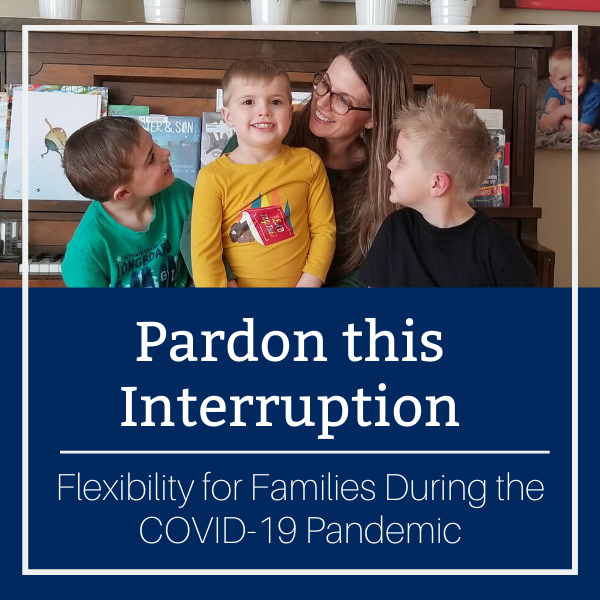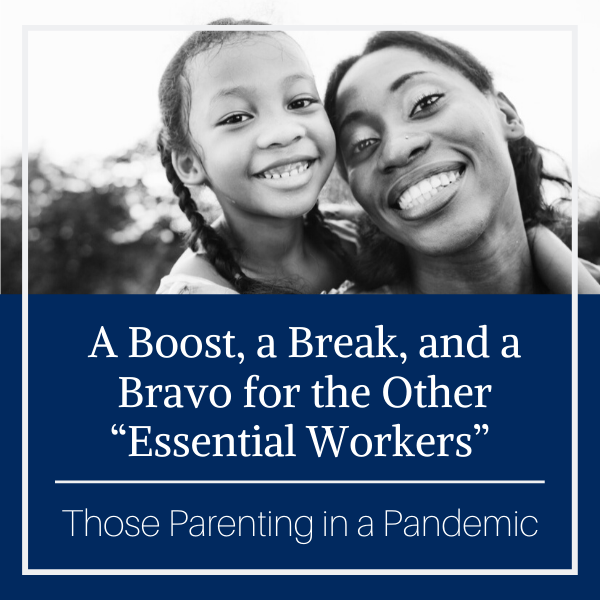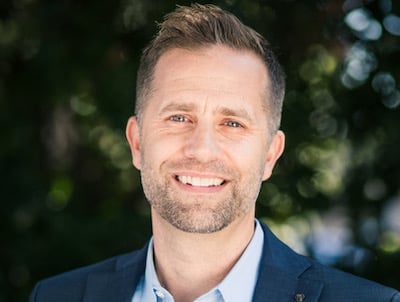Blog
Pardon this Interruption: Flexibility for Families During the COVID-19 Pandemic
By Amy K. Syvertsen, PhD, Director of Applied Quantitative Research and Senior Research Scientist
I often work from home to have uninterrupted time. But uninterrupted time is not what I’m expecting when I’m home in the next few weeks for “social distancing” during the COVID-19 pandemic.
Like thousands of other workplaces, schools, and businesses, Search Institute is encouraging all employees who can to work remotely. We hope to keep our work moving while doing our part to minimize the risk of spreading the coronavirus. We also want to ease the stress on those who have the added challenges of caring for children, parents, other family members, or themselves.
I’m among them. I’ll be working from home with three new “coworkers:” Hans (8), Julian (5), and Crosby (2). All day. Every day. It will be fun, memorable, and high-energy. But it will definitely not be uninterrupted time!
The value of flexibility
As we were trying to figure out this new normal (at least for a while), I talked with a few other parents who are in similar situations. What, I asked, could our employers realistically do to reduce the complexity and stress for people who are balancing remote work with family responsibilities during this pandemic?
Here are some things we thought would not only help us but could, in some cases, give us a fresh perspective on our daily work lives:
- Be flexible. As much as possible, let people work their hours each week when they can. This may mean having meetings and doing work outside of typical business hours.
- Re-evaluate meetings. If a meeting is important to keep us moving forward, schedule it and make it happen virtually. People will attend, if they can. If not, someone can fill them in. If it can be shorter, that’s better. If it can wait, reschedule it for later.
- Kids are welcomed. We love kids. (It’s why we do what we do.) If someone joins a call or a videoconference, and their kid needs them (or, has a super important question about dinosaurs), apologies are not needed. In fact, a lighthearted break might be just what everyone needs. (And someone else on the call may know a lot about dinosaurs, too.)
- Show each other grace. We’re all in this together, and we’re all doing our best to meet competing personal, professional, and community demands. Many of us are putting in 8 to 12 hours of child/family care each day, plus feverishly shoving eight hours of work into early mornings, late nights, and the highly-variable nap time. In between, we’re playing new roles like principal, teacher, public health advocate, and outdoor activities coordinator. All while trying to stay healthy and protect the people around us. So grace goes a long way when we seem frazzled by it all.
- Be open about priorities. Now is a good time to remind partners, clients, and others that our companies and organizations are part of our communities, and to acknowledge that all of us have other responsibilities. So if there are interruptions by children or other caregiving responsibilities, think of them as reminders of the priority we place on supporting employees, kids, and families—and the well-being of the communities in which we live.
Each workplace is different and each has constraints on what it can and cannot do. I’m grateful that these ideas are ones that we can embrace at Search Institute with full support from our leadership.
The inequity of flexibility
Even with flexibility, this situation is stressful and, yet, my colleagues and I are also fully aware of what a privilege this flexibility is. A privilege that isn’t true for the vast majority of America’s workforce.
Many people’s jobs don’t have that option. If they don’t or can’t work, they can lose jobs, wages, health insurance (if they have it), and more. And when the rest of us stop using their services (like eating at their restaurants or going to get a haircut) to maintain our social distancing, they – and their children – are hit the hardest by this pandemic.
This reality shines a particularly bright (dark?) light on the inequities between the flexibility I enjoy and the frayed safety net and unforgiving employment practices that constrain U.S. families with low-wage, low-flexibility jobs. So it is commendable that the U.S. House of Representatives passed legislation last week that would guarantee medical leave, paid sick leave, unemployment insurance, and other basic benefits for low-income families impacted by the coronavirus. This is a start.
These kinds of supports should be available for all workers all the time (like they are in most other industrialized countries), not just in a time of an unprecedented national health crisis. Their health and well-being are always important to our society.
Rediscovering our interconnectedness
The COVID-19 pandemic is a challenge unlike any that many of us have faced in our lifetime. We increasingly see that protecting ourselves requires also protecting others. And, at the core of this, there are many important lessons for us to learn about social solidarity and social responsibility. If we can rediscover this interconnectedness in a fresh way, we have the opportunity to deepen connections and relationships in the coming weeks and months that will make us stronger families, workplaces, and communities.
Our lives will have been interrupted, but we will have learned and grown and, I hope, made some new memories along the way with our families and colleagues.




